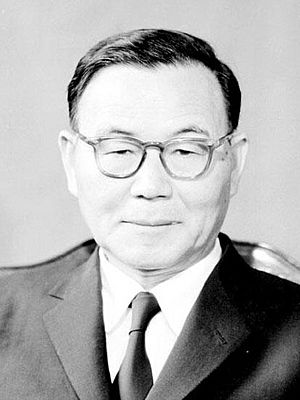Yun Posun facts for kids
Quick facts for kids
Yun Posun
|
|
|---|---|
|
윤보선
尹潽善 |
|

Official portrait, 1960
|
|
| 2nd President of South Korea | |
| In office August 13, 1960 – March 24, 1962 |
|
| Prime Minister | Ho Chong Chang Myon Chang Do-yong Song Yo-chan |
| Preceded by | Rhee Syngman |
| Succeeded by | Park Chung-hee |
| 2nd Mayor of Seoul | |
| In office December 15, 1948 – June 5, 1949 |
|
| Preceded by | Kim Hyong-min |
| Succeeded by | Lee Ki-poong |
| Personal details | |
| Born | August 26, 1897 Sinhang-ri, Dunpo-myeon, Asan County, South Chungcheong, Joseon (present day South Korea) |
| Died | July 18, 1990 (aged 92) Anguk-dong, Jongno District, Seoul, South Korea |
| Resting place | Yun Family Cemetery |
| Political party | Democratic (1955) → New Democratic (1967) (Liberalism in South Korea) |
| Spouses | Lady Min (1910s–1937), Gong Deok-gwi (1948–1990) |
| Relations | Uncle: Yun Chi-sung |
| Children | 4 |
| Alma mater | University of Edinburgh (BA, MA) |
| Religion | Christianity |
| Signature |  |
| Korean name | |
| Hangul | |
| Hanja | |
| Revised Romanization | Yun Boseon |
| McCune–Reischauer | Yun Posŏn |
| Art name | |
| Hangul | |
| Hanja | |
| Revised Romanization | Haewi |
| McCune–Reischauer | Haewi |
| Courtesy name | |
| Hangul | |
| Hanja | |
| Revised Romanization | Gyeongcheon |
| McCune–Reischauer | Kyŏngch'ŏn |
Yun Po-sun (Korean: 윤보선; Hanja: 尹潽善; Korean pronunciation: [junbosʌn] or [jun] [posʌn]; August 26, 1897 – July 18, 1990) was an important South Korean politician and activist. He served as the second president of South Korea from 1960 to 1962. He was the only president during South Korea's Second Republic, which used a parliamentary system.
Yun became involved in politics after World War II. He worked as a Secretary to Korea's Chief of Staff in 1947. In 1948, he became the Mayor of Seoul. From 1949 to 1950, he served as the Commerce Minister for the newly independent Korea. In 1955, Yun helped create the South Korean Democratic Party. He had to leave the presidency because of a military takeover led by Park Chung-hee in 1961. This event is known as the May 16 coup.
Contents
Early Life and Education
Yun Po-sun was born in Dunpo-myeon, Asan, South Chungcheong Province in 1897. His parents were Yun Chi-so and Lady Yi Beom-suk. His family had a long history, tracing back to a famous scholar from the Joseon period.
Yun studied in the United Kingdom. He earned a Master of Arts degree from the University of Edinburgh in 1930. He then returned to Korea in 1932.
Starting a Political Career
Yun began his political journey in 1945, after Korea gained its freedom on Liberation Day. Dr. Syngman Rhee, who later became the first President of South Korea, was his mentor.
By 1947, Yun was working as a Secretary to the Korean Chief of Staff. In 1948, President Rhee appointed Yun as the mayor of Seoul. A year later, he became the Minister of Commerce and Industry. However, Yun soon started to disagree with Rhee's strong leadership style, which he felt was too controlling.
While serving as president of the Red Cross Society, Yun was elected to the National Assembly in 1954. The next year, he helped start the opposition South Korean Democratic Party. In 1959, he became a representative on the Supreme Council of the Democratic Party.
Serving as President (1960-1962)
In 1960, President Rhee's government was removed from power by a student-led protest for democracy. This event is called the April Revolution. Yun was then elected president by the new parliament on August 13, with Chang Myon as Prime Minister.
After Rhee's rule, South Korea changed to a parliamentary system. This meant the president, Yun, mostly served as a symbolic leader, while the Prime Minister held most of the power.
In 1961, Park Chung-hee led a military takeover. Yun stayed in his role for a short time to help the new government appear more legitimate. However, he resigned on March 22, 1962. In the years that followed, Yun faced legal trouble several times for speaking out against the government. He opposed Park's strict rule and ran for president twice, in 1963 and 1967, but did not win.
Yun stopped being actively involved in politics in 1980. He then spent his life focused on cultural activities until he passed away on July 18, 1990.
Awards and Recognition
- Grand Order of Mugunghwa
- In-Cheon Cultural Award
See also
 In Spanish: Yun Bo-seon para niños
In Spanish: Yun Bo-seon para niños
- Yun Chi-ho
- Yun Chi-Oh
- Yun Chi-Young
- Chang Myon
- Chang Chun-ha
- August 1960 South Korean presidential election
- 1963 South Korean presidential election
- 1967 South Korean presidential election
 | Delilah Pierce |
 | Gordon Parks |
 | Augusta Savage |
 | Charles Ethan Porter |

